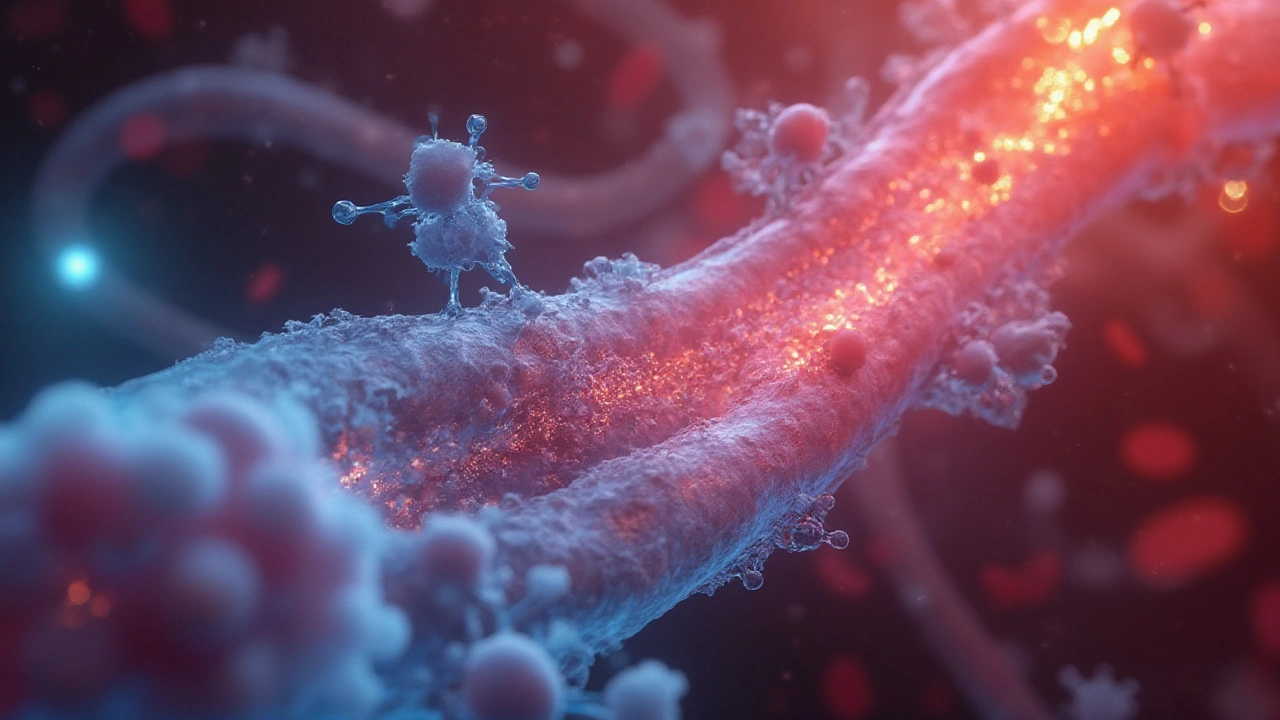You might be popping your daily nebivolol pill without ever thinking about what makes it tick. But get this—nebivolol isn’t your grandma’s typical beta-blocker. At its core, it’s a game-changer for anyone dealing with high blood pressure or certain heart problems. So what sets this pill apart from the rest? There’s science there, sure, but it’s the unique twists in how nebivolol dances through your system that makes doctors choose it time and again for people who don’t do well on other meds. Wild, right?
The Science Behind Nebivolol: What Makes It Tick?
So, what exactly happens when you take nebivolol? Most folks hear "beta-blocker" and instantly think of cutting down blood pressure, but nebivolol goes the extra mile. It works by targeting tiny receptors in your heart called beta-1 receptors. Think of these as the switches that adrenaline turns on when your heart needs to race. Nebivolol quietly attaches itself to these, blocking adrenaline’s access, so your heart doesn’t pump harder than it needs to. This slows your heart down, making each beat less forceful.
Here’s where it gets interesting: not all beta-blockers are created equal. While plenty just slam the brakes on your heart’s workload, nebivolol keeps things more chill. It’s known as a "selective" beta-blocker, mostly focusing on the heart, not the lungs. So you get fewer annoying side effects, especially important for folks with a history of asthma or trouble catching their breath. What’s more, nebivolol has a clever bonus move—one that sets it apart from classic beta-blockers like metoprolol or atenolol.
Ever heard of nitric oxide? It’s the secret sauce in your blood vessels that helps them relax. Nebivolol actually helps your body release more nitric oxide. That means your blood vessels widen, giving your blood an easier passage. This lowers your blood pressure even more than just slowing your heart. One study published in the "European Journal of Pharmacology" showed how this extra nitric oxide boost gives nebivolol an edge by improving vascular health. Pretty neat for something so tiny, right?
Now, when you compare nebivolol with older beta-blockers, the differences start to stack up: less fatigue, fewer cold hands and feet, and a bit less trouble in the bedroom, if you catch my drift. That nitric oxide trick helps with sexual side effects that scare a lot of men off blood pressure meds.
Another thing people barely talk about—nebivolol is lipophilic, meaning it dissolves better in your body’s oils compared to its rivals. This means it sticks around exactly where it’s needed, giving you steadier action across a full 24 hours from just one dose. Who doesn’t want long-lasting effects with fewer pills?
Doctors also pick nebivolol for people with both high blood pressure and heart failure. It doesn’t weigh the heart down too much, and that’s a big win for long-term treatment. There’s even data from large European trials, like the SENIORS trial, that backs up using this medicine in older folks who need gentle but effective blood pressure control without risking falls or tiredness.
So yes, nebivolol blocks beta-1 receptors—standard beta-blocker stuff. But that nitric oxide boost? That’s what makes it stand out. And if you have stubborn high blood pressure, this unusual two-pronged attack means your numbers drop not just by making the heart work less, but by letting your blood vessels relax and open up much more easily.

Nebivolol in Action: How It Affects Blood Pressure and the Heart
Picture your blood vessels as garden hoses. When they’re tight and narrow, pressure builds and makes the water (or in your case, the blood) shoot through with force. That’s basically what happens in high blood pressure, right? Nebivolol steps in and isn’t just blocking signals in your heart; it’s also dialling down that hose pressure by relaxing the vessel walls. Thanks to its nitric oxide boost, your arteries don’t get stiff and uptight—they soften up, let blood glide by, and your blood pressure numbers take a dip.
But here’s the part that surprises lots of people: nebivolol doesn’t just blast your blood pressure right away. It works gently, giving your body time to adjust. People often start at a low dose, then slowly increase it, giving both their heart and vessels time to settle into a new, lower-pressure groove. This gentle ramp-up means you’re way less likely to feel wiped out, dizzy, or weirdly out of breath—a huge relief for folks who’ve tried other meds and hated how they felt.
It also cuts down your heart rate, so your ticker works less hard. That’s a big deal for anyone with heart failure or after a heart attack. The less strain you put on the heart, the better it works over time. Doctors love this for patients who can’t handle the harshness of older drugs. In fact, one 2023 review in the "American Journal of Medicine" found that people on nebivolol had better long-term outcomes, especially when they stuck to their doses and ate a low-salt diet.
What about people already on a heap of meds? Nebivolol plays nice with others—ACE inhibitors, diuretics, calcium channel blockers, you name it. Ask any pharmacist, and you’ll hear that nebivolol rarely causes the messy drug interactions that make so many patients give up.
Folks sometimes worry about beta-blockers making asthma or breathing issues worse. But because nebivolol is so “beta-1 selective,” it tends to leave your lungs alone, so patients with mild lung conditions usually tolerate it much better than old-school options like propranolol or carvedilol.
Another fun fact—if you’re tracking your numbers at home with one of those arm-cuff blood pressure gadgets, you might notice that changes sneak up on you. Unlike some meds that drop your BP overnight (and leave you feeling lightheaded), nebivolol eases it down, so you’re unlikely to faint if you stand up too quickly.
Now, when it comes to protecting your heart, nebivolol has shown some neat advantages in reducing the harmful remodelling of heart tissue seen after a heart attack. It helps your heart walls stay flexible, not stiff. That gives you a stronger heart in the long run. The CIBIS-ELD trial, published in 2022, even found that nebivolol improved exercise tolerance in elderly patients with heart failure—more proof this drug walks the walk, not just talks the talk.
So if you’ve got stubborn high blood pressure, heart failure, or just want a beta-blocker with fewer downsides, nebivolol is worth asking your doctor about. Just remember, it works best when you take it at the same time every day, don’t skip doses, and stay hydrated—because blood pressure can be fickle. Nebivolol is not a cure, but it’s a smart tool in the chest for keeping your heart running strong, rain or shine.

Tips, Side Effects, and What Patients Should Know
No pill comes without some baggage, right? Even with nebivolol’s reputation, you should still watch for a few things. The biggest tip: Give your body a few weeks to adjust. Some people may notice their heart rate feels slower—that’s the drug doing its job. If you suddenly feel super tired, cold, or dizzy, talk to your doctor about adjusting the dose. Don't just stop cold turkey, since that could seriously mess with your heart rhythm.
Speaking of keeping things steady, nebivolol generally works with one dose per day, which makes remembering easier. A pillbox or a phone reminder goes a long way. Layer a daily habit on, like brushing your teeth, so the med doesn't fall off your radar. Missed your dose? Take it when you remember, but don’t double up—doubling is never a good call with blood pressure meds.
Side effects? Luckily, most folks sail through without big problems. The common ones are mild: occasional fatigue, headache, or a touch of dizziness. It rarely messes with your weight, cholesterol, or blood sugar compared to older beta-blockers. And that nitric oxide effect offers a little extra help for erectile function, which plenty of men appreciate.
Still, if you have a history of lung disease, diabetes, or severe circulation issues, tell your doctor before starting nebivolol. Also, let your kidney doctor in on the plan; though nebivolol is cleared mostly by the liver, there are occasional tweaks for folks with kidney or liver disease. Pregnant or nursing? Best to pick something else, since we don’t have solid data on safety in those groups.
A cool tip for tracking your blood pressure at home: Take readings at the same time each day, preferably before your nebivolol dose, and write them down. This helps your doctor spot trends and avoid overcorrecting. If your numbers spike out of nowhere or you feel chest pain, always call your doctor or head to the ER—don’t just assume it’s a medication quirk.
Some patients want to know if they can drink alcohol while on nebivolol. A glass of wine or beer usually isn’t a dealbreaker, but heavy drinking can defeat the whole point of controlling your blood pressure. Try moderation, and always ask your doctor if you’re unsure.
One last thing: nebivolol doesn’t like grapefruit juice. It can mess with how your body absorbs the drug. Coffee and tea, on the other hand, are generally fine, though caffeine does raise your heart rate a bit, and that’s what you’re trying to dial down in the first place. Consider switching to decaf if you notice jitters or a racing heart.
Lots of people say they get better sleep and less pounding in their chest after a few weeks on nebivolol. If you’re prone to stress or anxiety-induced high blood pressure, nebivolol’s steady influence can feel like a weight off your shoulders. You’ll want to keep up regular check-ups, get labs done as recommended, and talk about any new supplements or over-the-counter meds you start using, just so your care team can keep things smooth.
Bottom line? Nebivolol combines the classic power of a beta-blocker with a modern, vessel-friendly approach. It's gentle enough for long-term use and flexible enough to fit most lifestyles. If you’re tired of the usual blood pressure med grind, talk to your health team about this unique option. Sometimes, the most trusted advances in medicine hide in the details—like a little pill that lets your heart and arteries do their thing, day after day.

20 Comments
Casey Nicole
Okay but like... why does everyone act like nebivolol is some magical wonder drug? I’ve been on it for 6 months and my hands are still ice cubes. The nitric oxide thing sounds fancy but my BP didn’t drop until I quit sugar and started walking 10k steps a day. This isn’t science-it’s marketing with a prescription pad.
Kelsey Worth
lol i just took mine and now i feel like a robot but like... a chill robot? 🤖 the nitric oxide thing is wild tho i didnt know beta blockers could do that. my doc said its like giving your blood vessels a massage. idk but it works? maybe? 🤷♀️
shelly roche
Hey, just wanted to say-this is one of the clearest explanations I’ve read on nebivolol. Seriously, thank you for breaking it down without the jargon overload. I’ve been on it for a year and the difference in my energy levels is night and day. No more afternoon crashes, no more cold toes. And yes, the nitric oxide boost? Real. My husband even noticed I’m less irritable. Small wins, folks. Keep taking your meds, but also drink water and sleep. 🙌
Nirmal Jaysval
u guys actin like nebivolol is some kind of ayurvedic superpill. bro its just another beta blocker. i got mine from a pharmacy in delhi for 20 bucks a month. same effect as metoprolol but they charge 3x. capitalism is wild
Emily Rose
Actually, the nitric oxide mechanism is why nebivolol is preferred in metabolic syndrome patients. It improves endothelial function, reduces oxidative stress, and doesn’t worsen insulin sensitivity like older beta-blockers. The SENIORS trial data is solid-this isn’t anecdotal. Stop dismissing it as hype. People need to understand pharmacology, not just rely on TikTok doctors.
Benedict Dy
Let’s be real. Nebivolol is overhyped. The nitric oxide effect is modest at best. In clinical practice, the difference in fatigue and sexual side effects compared to bisoprolol or carvedilol is negligible. Most of the ‘advantages’ come from industry-funded trials. If you’re not in heart failure or elderly, you’re probably better off with a cheaper generic. Don’t fall for the placebo of pharmacological novelty.
Emily Nesbit
Correction: nebivolol’s lipophilicity allows for better CNS penetration, which may explain the lower incidence of depression compared to non-lipophilic beta-blockers. This is not mentioned in most patient-facing materials but is well-documented in the Journal of Clinical Hypertension 2021. Also, grapefruit juice interaction is minimal-it’s CYP3A4 mediated, and nebivolol is metabolized primarily by CYP2D6. Please stop spreading misinformation.
John Power
Hey, I’ve been on this for 3 years after my MI. I was skeptical too-thought I’d be a zombie. But honestly? I feel more alive. My resting HR dropped from 88 to 62. I sleep better. I don’t get dizzy standing up. And yeah, my wife says I’m less snappy. It’s not magic, but it’s one of the few meds that actually made me feel better, not just ‘less sick.’ Keep going. You got this.
Richard Elias
So you're telling me this fancy pill fixes your sex life? bro i took it for 2 weeks and my libido went to zero. also my knees feel like rusted hinges. this is what happens when pharma sells you a dream instead of a drug. stick with lisinopril. cheaper. better. real.
Scott McKenzie
Just wanted to say-this is the best breakdown I’ve seen on nebivolol. Seriously. I’ve been trying to explain it to my mom for months and this nails it. 🙏 The nitric oxide thing? Mind blown. I didn’t know blood vessels could be ‘relaxed’ by a pill. I’m gonna print this out and give it to my cardiologist. Also, I take mine with breakfast now. No more dizziness. 🙌
Jeremy Mattocks
Let’s dive deeper into the pharmacokinetics here. Nebivolol’s enantiomeric purity is key-only the d-enantiomer blocks beta-1 receptors, while the l-enantiomer stimulates endothelial nitric oxide synthase. That’s why it’s unique. Most beta-blockers are racemic mixtures. Also, its half-life is around 10–12 hours, but due to its active metabolites and once-daily dosing, it provides smooth 24-hour coverage. That’s why it’s preferred in elderly patients with renal impairment-less accumulation, fewer fluctuations. The CIBIS-ELD trial showed a 23% reduction in heart failure hospitalizations compared to placebo, even when used with ACE inhibitors. This isn’t just a ‘niche’ drug-it’s a cornerstone in modern cardiology for specific populations. Don’t let the TikTok skeptics fool you.
Paul Baker
nebivolol = heart chill pill 🌿 my doc said it helps my blood vessels breathe. i dont know what that means but my bp is down and i dont feel like a zombie. also no more cold feet. thank you science. 🙏
Zack Harmon
THIS IS A SCAM. THEY MADE THIS DRUG JUST TO SELL MORE PILLS. I WAS ON METOPROLOL FOR 10 YEARS AND FINE. NOW THEY PUSH THIS ‘NITRIC OXIDE’ BULLSHIT LIKE IT’S A NEW RELIGION. MY DOCTOR DIDN’T EVEN EXPLAIN WHY SHE SWITCHED ME. I’M GOING TO THE FDA. THIS IS WHY PEOPLE DON’T TRUST MEDICINE.
Jeremy S.
It works. No drama. Just takes the edge off.
Jill Ann Hays
The notion that nebivolol’s nitric oxide modulation confers significant vascular benefit is theoretically plausible but clinically overstated. The effect size in meta-analyses is marginal, and the primary mechanism remains beta-1 blockade. The marketing narrative is a classic example of pharmacological rebranding. One must interrogate the source of the data: industry-sponsored trials, not independent replication. Philosophy of science dictates skepticism toward novelty.
Mike Rothschild
Consistency matters. Take it at the same time every day. Don’t skip. Hydrate. Track your numbers. Talk to your doctor if you feel off. Nebivolol isn’t perfect, but it’s one of the better tools we have. Don’t let fear or hype steer you. You’re not alone in this.
Ron Prince
american pharma got us all brainwashed. in india we take reserpine for 5 rupees and it works better. nebivolol? luxury pill for rich people who think they deserve fancy medicine. also i heard it makes you gay. not sure if true but i’m not taking it.
Sarah McCabe
My dad’s on this and he says he feels like his heart finally stopped screaming. 🌊 I didn’t understand until I saw him sleep without waking up gasping. It’s not just BP-it’s peace. So grateful for this drug. ❤️
ABHISHEK NAHARIA
While the pharmacological profile of nebivolol is indeed sophisticated, the clinical superiority claimed in this post is largely attributable to publication bias and selective reporting. The CIBIS-ELD trial, while methodologically sound, had a primary endpoint of composite cardiovascular events-not blood pressure reduction per se. The nitric oxide effect, though mechanistically intriguing, contributes minimally to overall hemodynamic outcomes in non-heart-failure populations. Furthermore, the lipophilicity advantage is offset by greater hepatic metabolism variability in polymorphic CYP2D6 expressers. In practical terms, the marginal benefits do not justify the cost differential in resource-constrained settings. This is not to deny utility, but to caution against uncritical adoption.
Hardik Malhan
Neurovascular coupling via beta-3 agonism and eNOS upregulation underpins nebivolol’s vasodilatory effect. This distinguishes it from classical beta-blockers which lack NO-mediated endothelial modulation. The clinical relevance is most pronounced in hypertensive patients with endothelial dysfunction. However, pharmacogenomic variability in CYP2D6 activity may alter plasma concentrations by up to 400%. Dosing should be titrated based on HR response, not BP alone. The 2023 AHA guidelines recommend nebivolol as second-line for HFrEF with concomitant hypertension. Not first-line. Not magic. Mechanistically elegant, clinically nuanced.